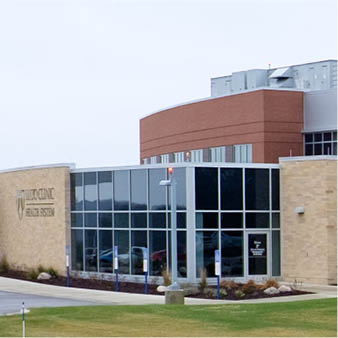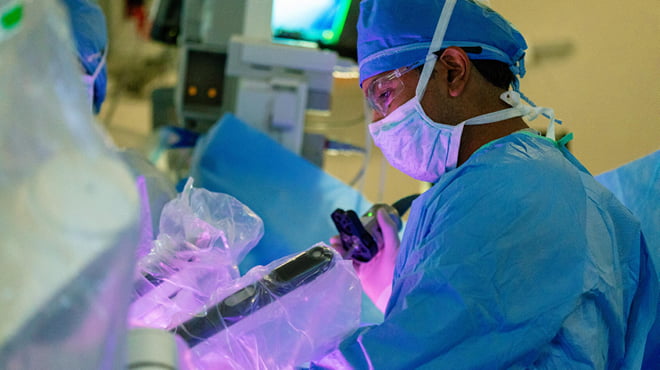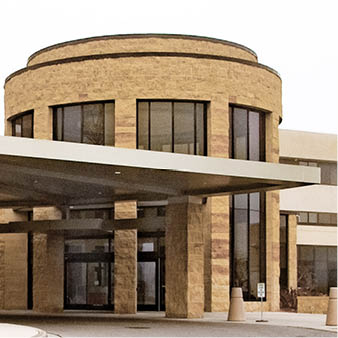
Recent Blogs
Anesthesiology Services & Treatments
If you are undergoing a medical intervention that requires anesthesia, you are in good hands. Our anesthesia team’s goal is to ensure a pain-free and comfortable experience while closely monitoring your pain, anxiety and vital organ function. Not only do they help alleviate pain and discomfort, but their support also allows doctors to perform intricate and invasive procedures with precision and control. By preventing pain and managing vital signs, anesthesia experts contribute to the safety and effectiveness of medical interventions, improving your recovery and healing.
Find out more about our services:
- Conditions and consultations
- Diagnosis and treatments
- Anesthesia specialists
- FAQ
- Anesthesia locations near you
- Anesthesia specialists near you
Conditions and consultations
Our anesthesia team provides coordination of comprehensive pain management options during these medical interventions:
- Diagnostic testing
- Labor and delivery
- Screening
- Surgery or procedure
- Tissue sample removal
Diagnosis and treatments
Our experienced anesthesiology experts offer these treatments:
- Bier block (IV block). Injected into your bloodstream, used for specific procedures involving an arm or leg. It causes temporary numbness and pain relief in the specific surgical extremity. You are awake but may be given a sedative to make you sleepy and less anxious.
- Epidural anesthesia. Administered through a tiny tube called a catheter, which is placed just outside the spinal canal at the small of the back. The epidural catheter allows for a continuous infusion of medication to keep you comfortable during and after your procedure.
- General anesthesia. Administered by IV or by breathing anesthetic gases. With general anesthesia, you are completely unconscious during the operation and have no feelings of pain, awareness or movement.
- Labor epidural anesthesia. Administered similar to epidural anesthesia, it is specifically used to keep you comfortable throughout labor and delivery. It allows most women to participate in the birth experience fully (continue to feel touch and pressure) while relieving most, if not all, of the pains of labor. • Local anesthesia. Injected directly into the tissue at the surgical or suture site. It is frequently used for minor procedures to make you more comfortable.
- Monitored anesthesia care (MAC). Delivered via an IV or injection at the surgical site. It allows you to be awake throughout the procedure, although you may feel very relaxed and sleepy.
- Regional blocks (nerve blocks). Injected near the surgical site to temporarily numb a group of nerves, such as the shoulder, arm, hand, leg or foot. You are awake but may be given a sedative to make you sleepy and less anxious.
- Spinal anesthesia. Administered through a needle temporarily placed in your lower back. Local anesthetic is delivered through this needle, causing you to temporarily lose all sensation from the waist down, including the ability to move your legs.
Anesthesiology specialists
Our anesthesia team is comprised of anesthesiologists (physicians) and certified registered nurse anesthetists (CRNAs).
- Anesthesiologists are board-certified physicians with specialized training in anesthesiology.
- CRNAs are advanced practice nurses with specialized graduate-level education in anesthesiology.
Our anesthesiologists and CRNAs work as a team to provide the best possible care in the safest possible manner. They specialize in anesthetic administration, pain relief and patient care before, during and after surgery. They will stay with you throughout your procedure and closely monitor your pain, anxiety and vital organ function.
Find anesthesia specialists near you.
Additional care and therapies may be provided by:
FAQ
What should I tell my anesthesia provider?
You will meet with your anesthesia provider before your surgery or procedure to discuss the type of anesthesia that will be used. The preoperative interview is key in selecting the best anesthetic for you. For your anesthesia provider to determine which type of anesthesia is the best for you, it is important that you inform your anesthesia provider about:
- Food and drink intake during the last 24 hours
- History of difficulty breathing after anesthesia
- History of lower back problems
- Family history of high fevers
- Respiratory problems, such as asthma, bronchitis, pneumonia, or if you have a cold, sore throat or the flu
- Special medical concerns, such as cardiac disease, diabetes, kidney disease, liver disease and other medical conditions
How can I prepare for my surgery?
Review the answers to 6 common questions as you prepare for your surgery.
What can I expect during my procedure?
After visiting with the anesthesia provider and determining a plan that is optimal for you, you will be taken to a room where staff will place a monitoring device on you, such as a blood pressure cuff and EKG electrodes. You may or may not remember going into the procedure room because sedation medications are often given through an IV as you come into the room. A member of the anesthesia care team stays with you constantly during your procedure, monitoring you closely and adjusting your medications, breathing, temperature, fluids and blood pressure as needed.
When the procedure is complete, the anesthesia drugs are discontinued, and you will gradually wake up. You may feel groggy and possibly even slightly confused. You will be taken to the recovery area, where you will be closely monitored until you are fully awake.
Why can’t I eat or drink anything during my procedure?
You may be told not to eat or drink anything for eight hours prior to your procedure. It is very important that you follow whatever instructions you are given for not eating or drinking. You usually swallow saliva and food without choking because part of the swallowing mechanism involves a reflex that covers the opening into the lungs. When you are given anesthesia, you lose this ability to protect your lungs from inhaling things you're not supposed to inhale. Any solids or liquids in your stomach may “reflux” up your esophagus into your mouth and be inhaled into your lungs. The result could be a severe lung infection.
My child is scheduled to have surgery; what can I expect?
Before surgery, you will be given instructions on limiting your child’s eating and drinking. We realize this is not always easy, but these instructions must be followed for your child’s safety. If your child has not followed these instructions, tell the anesthesia provider.
You will be able to stay with your child until they go to the operating room. Once they are taken to the operating room, your child receives the anesthetic either by breathing gas through a mask or by injecting medicine into an IV. Blood pressure, heart rate, breathing, oxygenation and temperature are closely monitored. Medications are given to prevent pain and nausea so that the child will wake up as comfortably as possible.
After the surgery, your child will be taken to the recovery area for constant monitoring until they are fully awake. It is not uncommon for children to be somewhat emotional or disoriented during this waking period; however, most often, they will not remember this. As soon as your child is safely settled in the recovery area, a care team member will come and get you to be with your child as they recover from their anesthetic.
We realize the hospital can be scary for children, and we try to make this as pleasant as possible for them.
What are my payment options, and do you offer financial assistance?
Visit the billing page of your preferred location for information on insurance, billing and payments.
We serve patients in difficult financial circumstances and offer financial assistance to those who have an established need to receive medically necessary services. Learn more about financial assistance options.
Do you have an after-hours number in case of emergency?
Always call 911 in case of an emergency. For after-hours help with other issues, get virtual care 24/7 through the Primary Care On Demand app or review our convenient care options.
Explore locations or providers near you for details on anesthesiology:
Locations View More







